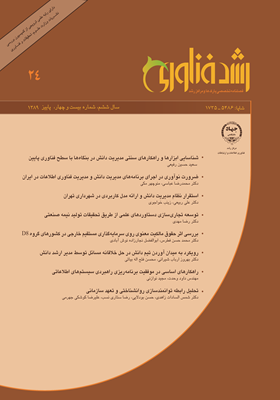بررسي اثر حقوق مالکيت معنوي روي سرمايه¬گذاري مستقيم خارجي در کشورهاي گروه D8
محورهای موضوعی :محمد حسن فطرس 1 , ابولفضل نجارزاده نوش آبادی 2 *
1 - دانشگاه بوعلی سینا
2 - -
کلید واژه: سرمايه¬گذاري مستقيم خارجي, حقوق مالکيت معنوي, کشورهاي گروه 8D,
چکیده مقاله :
حقوق مالکيت معنوي نقش مهمي در رشد اقتصادي بلند مدت جوامع دارد. ازاين روي، نهادهاي بين المللي همچون سازمان تجارت جهاني و سازمان مالکيت معنوي جهاني در سال هاي اخير، توصيه هايي به اعضاي خود مبني بر تامين و تقويت اين عامل تعيين کننده کرده اند. همچنين، شکاف در نظامهاي مالکيت معنوي در بين کشورهاي توسعه يافته و در حال توسعه، به عنوان يکي از علل تفاوت در سطح جريان سرمايه گذاريهاي مستقيم خارجي و جريان بين المللي سرمايه هاي خصوصي به شمار ميآيد. اين پژوهش از طريق تحليل شاخصي داده هاي دوره زماني 2005-1985، به بررسي و مقايسه نقش حقوق مالکيت معنوي بر سرمايه گذاري مستقيم خارجي در کشور هاي گروه D8 مي-پردازد. پرسش اين است که آيا حمايت از حقوق مالکيت معنوي اثر مثبتي روي سرمايه گذاريهاي مستقيم خارجي در کشورهاي گروه D8 دارد؟ نتايج بررسي نشان ميدهد، رابطه بين حقوق مالکيت معنوي وسرمايه گذاري هاي مستقيم خارجي با توجه به ظرفيتهاي زير بنايي و سطح توسعه يافتگي کشورها در بين کشورهاي گروه 8D متفاوت ميباشد.
Intellectual property rights have a prominent role in long-term economic growth of the countries. In recent years International institutions such as WTO (World Trade Organization) and World Intellectual Property Organization (WIPO) have suggested to their member countries the provision and the fortification of these rights. The existing gap between developed and developing countries in the field of property rights systems is also a distinguishing factor that affects the level of foreign direct investment and the flow of private international capitals. The present article by an index analysis of the data within the period of 1985-2005 of D8 countries investigates and compares the role of intellectual property rights on the foreign direct investment in these countries. The main question is that whether the protection of intellectual rights has a positive effect on foreign direct investment in the D8 group countries or not. The results of this survey indicate that the relationship between intellectual property rights and foreign direct investment varies according to the infrastructural capacities and the level of development of these countries.

